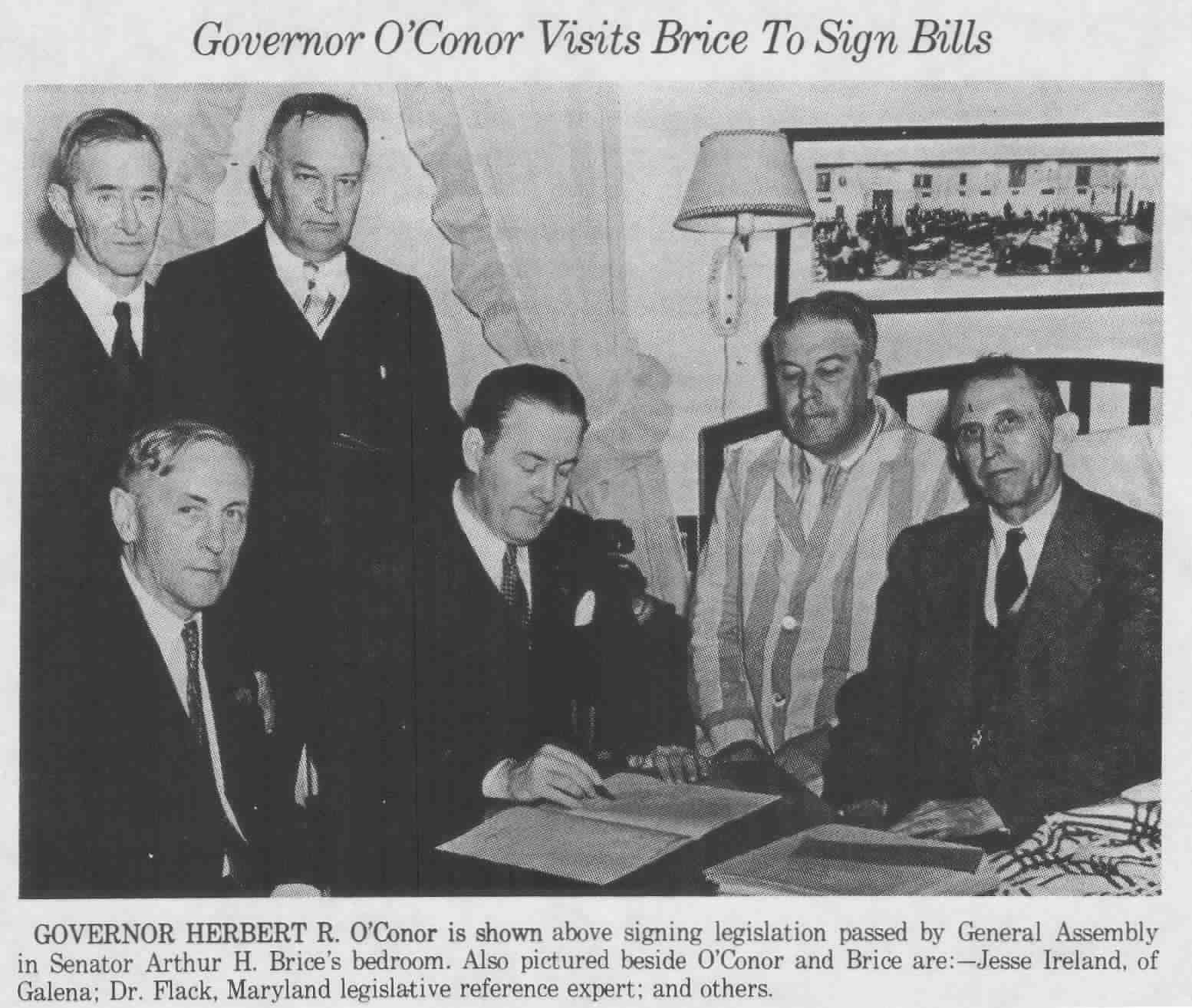Mr. President,
members of the Senate,
special guests,
Ladies and Gentlemen
Tonight the Senate of Maryland pays tribute to
ARTHUR H. BRICE (1886-1960)
Senate President from 1939-1943
Arthur H. Brice was born on February 8, 1886, in Betterton,
Kent County, son of Capt. Harvey (1861-?) and Elizabeth Crew (1865-1919)
Brice. His father originally lived in Caroline County and was a seaman,
eventually becoming a captain in the Chesapeake coastal trade. When he
retired from the Bay he settled in Betterton, Kent County, became a farmer,
and finally a businessman. Arthur was an only child.
Arthur H. Brice attended public schools in Betterton, and
Washington College in Chestertown for two years. In 1943 he was honored
by the college when he received a Doctor of Laws degree (LL.D) at the June
commencement that year. After leaving college he ran a mercantile business
in Betterton for five or six years. About 1910 he began farming at Betterton,
in which occupation he continued the rest of his life, eventually owing
3 farms (including his home, "Ellwood Farm," and managing 2000 acres for
the Clothier family of Philadelphia.
While at Washington College, Arthur Brice met and subsequently
married his first wife, Carrie A. Jones of Chaney Station, Calvert County.
Carrie A. Brice was the mother of their two children: A. Talbott, a physician;
and, Mary Elizabeth who married Richard M. Gamber. Carrie died in 1937,
and Arthur subsequently married a second time to Hallie Shipley.
They had no children.
Brice was a life-long Democrat, an active member of the Kent
County Democratic Party, a Mason, and a Methodist.
In 1919, Arthur H. Brice began his 41 year career as a public servant
in Maryland when he was elected County Commissioner for Kent. When his
term expired in 1923 he moved on to the House of Delegates from Kent, serving
from 1927 to 1933. He was elected to the Senate in 1935 where he remained
until 1943, serving as president in 1939, 1941, and 1943.
Perhaps his greatest legislative achievement was the passage of the
act acquiring Morgan College. According to one historian "it was
Arthur H. Brice, President of the Senate, who finally managed to line up
the votes in the upper house that made the bill's passage a practical certainty.
Without his persistent and courageous support this great reform would never
have become the law of Maryland." [Kirwin, 1962, p. 375]
In presiding over the Senate, Brice was known for his rapid gaveling
of legislation as the clock ticked closer to midnight of the ninetieth
day. In 1939, for example, while Jesse Holmes, the reading clerk, used
a long pole to push back the hands to keep the time from running out, President
Brice pushed legislation through at the rate of a law a minute, chanting
the familiar "... the question arises on the adoption of a favorable report,
all in favor vote aye, contrary no, ayes have it, favorable report adopted;
bill on second reading, are there any amendments, the chair hears none,
the bill is ordered passed to its third reading and final passage;
the Senator from Washington County moves that the rules be suspended for
the purposes of putting the bill on third reading and final passage, clerk
will call the roll on suspension of the rules. ..." So it went
until the sun rose on another day and the clock was permitted to reach
midnight, with a total that year of 779 bills finally voted on and presented
to the Governor for his signature. [as related by Harry W. Kirwin in The
Inevitable Success: Herbert R. O'Conor, 1962, p. 250] I
suspect it is no wonder that for the first and, as far as I know, the last,
time, a bill signing was held in the bedroom of an exhausted Senate President.

from Fred. G. Usilton, History of Kent County (ca. 1981),
p.280
Brice's state service continued after he retired from the
Senate. He was a member of the Public Service Commission Department of
Pubic Utilities, 1941-1951; Commissioner of Motor Vehicles, 1950-1951;
chairman, Board of Natural Resources, 1951—1955; chairman, Commission of
Tidewater Fisheries, 1951-1955; and, an ex-officio member of the
Water Pollution Commission, 1951—1955.
Brice was also a member of the Atlantic States Marine Fisheries
Commission in his capacity as chairman of the Commission on Tidewater Fisheries,
1953—54, and he was a delegate to two Democratic National Conventions.
While his career as public servant was for the most part exemplary,
Senator Brice did have one weakness shared by many of his contemporaries.
He liked to hunt ducks. In December 1954 he and his top aide on the Tidewater
Fisheries Commission were apprehended for duck baiting and forfeited their
$90.00 collateral. As a result, Governor McKeldin, found it necessary
to relieve him of his duties as on the Tidewater Fisheries Commission,
and, consequently, as Chairman of the Board of Natural Resources.
Arthur H. Brice retired to his farm where he was stricken
on Friday, July 22, 1960. He died three days later, on Monday, July 25,
1960 at 10:15 p.m. Following funeral services at the Betterton Methodist
Church he was buried in Still Pond Cemetery, Kent County.
Arthur H. Brice's gavel returns to the Senate as a gift from his grandson,
Arthur Brice. It will be cared for in the Special Collections
of the Archives where it will be available for exhibit, and for use on
special occasions by the Senate.
remarks on the
Presentation of the Arthur H. Brice Gavel
February 7, 2000
by
Dr. Edward C. Papenfuse, State Archivist
